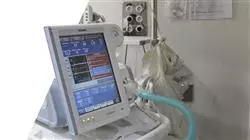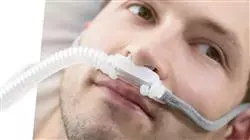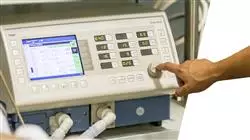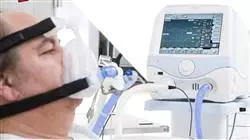University certificate
The world's largest faculty of nursing”
Introduction to the Program
Thanks to TECH, you will update your knowledge on the adjustment of ventilatory parameters in CPAP or BiPAP"

Recent scientific research continuously supports the application of Non-Invasive Mechanical Ventilation in various clinical settings. As a result, its use has gained popularity in the medical field in recent times. As a result, the techniques used for its implementation are constantly evolving, as well as the strategies for adjusting ventilatory parameters or the monitoring methods for each of them.
Therefore, nurses are obliged to know the latest advances in Non-Invasive Respiratory Support Techniques for Nursing in order to provide state-of-the-art care to their patients. Accordingly, TECH has designed this program, which enables the learner to explore cutting-edge strategies for pressure support ventilation or high-flow nasal cannula. It will also delve into procedures for monitoring and managing CPAP and BiPAP complications.
Because the program is delivered exclusively in a 100% online format, specialists will enjoy the flexibility to adapt their learning process to their daily commitments and schedules without time constraints.
In addition, the pedagogical approach of the program incorporates the application of Relearning, which ensures that students have a solid and lasting understanding of the fundamental concepts.
Identify the state-of-the-art protocols for monitoring and managing the complications of the different types of non-invasive respiratory support"
This Postgraduate certificate in Non-Invasive Respiratory Support Techniques for Nursing contains the most complete and up-to-date scientific program on the market. The most important features include:
- Practical cases presented by specialists in Pulmonology
- The graphic, schematic, and practical contents which provide scientific and practical information on the disciplines that are essential for professional practice
- Practical exercises where the self-assessment process can be carried out to improve learning
- Its special emphasis on innovative methodologies
- Theoretical lessons, questions to the expert, debate forums on controversial topics, and individual reflection assignments
- Content that is accessible from any fixed or portable device with an Internet connection
This program offers you the best didactic tools so that, through 6 weeks of intensive study, you can achieve a dynamic and decisive professional update"
The program’s teaching staff includes professionals from the field who contribute their work experience to this educational program, as well as renowned specialists from leading societies and prestigious universities.
The multimedia content, developed with the latest educational technology, will provide the professional with situated and contextual learning, i.e., a simulated environment that will provide immersive education programmed to learn in real situations.
This program is designed around Problem-Based Learning, whereby the professional must try to solve the different professional practice situations that arise during the academic year For this purpose, the students will be assisted by an innovative interactive video system created by renowned and experienced experts.
TECH's Relearning method will allow you to optimize your update, exploring the key aspects of the syllabus at your own pace of study"

Get to know the advanced techniques for humidification and temperature settings in NIMV"
Syllabus
The syllabus of this academic program has been developed with the purpose of providing the nurse with the most updated knowledge in the field of Non-Invasive Mechanical Ventilation and the latest respiratory support techniques available. The educational resources of this innovative Postgraduate certificate will be presented in various formats, such as simulation of real cases or interactive summaries. In addition, being 100% online, the student will be able to update their knowledge at the time and place of their choice.

The 100% online methodology of this Postgraduate certificate allows you to study without leaving your home"
Module 1. Noninvasive Respiratory Support Techniques
1.1. Evaluation of the Level of Ventilatory Support Needed
1.1.1. Evaluation of the Clinical Indications
1.1.2. Interpretation of Arterial Blood Gas Analysis
1.1.3. Evaluation of Respiratory Mechanics
1.1.4. Determination of the Level of Ventilatory Support Needed
1.1.5. Change of Ventilatory Modality
1.2. Continuous Positive Airway Pressure (CPAP)
1.2.1. Principles and Mechanics of CPAP
1.2.2. Indications for the Use of CPAP
1.2.3. Adjustment of CPAP Parameters
1.2.4. Monitoring and Management of CPAP Complications
1.2.5. Comparison of CPAP with Other Ventilatory Modalities
1.3. Positive Airway Pressure (BiPAP)
1.3.1. Principles and Mechanics of BIPAP
1.3.2. Indications for the Use of BIPAP
1.3.3. Adjustment of BIPAP Parameters
1.3.4. Monitoring and Management of BIPAP Complications
1.3.5. Comparison of BIPAP with Other Ventilatory Modalities
1.4. Pressure Supporting Ventilation
1.4.1. Conventional (PSV)
1.4.2. Proportional (PPSV)
1.4.3. Adaptive (ASV)
1.4.4. Intelligent Adaptive (iVAPS)
1.5. Volume-Controlled Ventilation
1.5.1. Principles and Mechanics of Volume Controlled NIV
1.5.2. Indications for the Use of NIV by Volume
1.5.3. How to Adjust the Volume Parameters
1.5.4. Monitoring and Management of Complications in Volume Mode
1.5.5. Comparison of Volume Mode with Other Ventilatory Modalities
1.6. High-flow Nasal Cannula (HFNC)
1.6.1. Principles and Mechanics of HFNCs
1.6.2. Indications for the Use of HFNCs
1.6.3. Adjustment of HFNC Parameters
1.6.4. Monitoring and Management of HFNC Complications
1.6.5. Comparison of HFNC with Other Ventilatory Modalities
1.7. Combined Ventilation (Positive Pressure (CPAP/BiPAP) + HFNC)
1.7.1. Principles and Mechanics of Combination Therapy
1.7.2. Indications for the Use of Combined Therapies
1.7.3. How to Initiate Combination Therapy, at the Same Time or in a Staggered Manner
1.7.4. Adjustment of Combined Therapies Parameters
1.7.5. Monitoring and Management of Combined Therapies Complications
1.7.6. Comparison of Combined Therapies with Other Ventilatory Modalities
1.8. High Frequency Ventilation
1.8.1. Indications for the Use of NIV with High Frequency
1.8.2. Parameter Adjustment
1.8.3. Usefulness in the Acute Patient
1.8.4. Usefulness in the Chronic Patient
1.8.5. Monitoring and Management of Complications
1.8.6. Comparison with Other Ventilatory Modalities
1.9. Other Ventilatory Modes
1.9.1. Pressure Support Ventilation with Mandatory Flow Control (MFC)
1.9.2. High Velocity Ventilation with Nasal Cannula
1.9.3. Other Innovative Ventilatory Modes
1.10. Humidification and Temperature Adjustment in NIV
1.10.1. Importance of Adequate Humidification and Temperature in NIV
1.10.2. Types of NIV Humidification Systems
1.10.3. Indications for Adding Humidifier in Acutely Ill Patients
1.10.4. Indications for Humidifier in Chronic Patients
1.10.5. Methods of NIV Humidification Monitoring
1.10.6. Temperature Adjustment in NIV
1.10.7. Monitoring and Management of Complications Related to Humidity and Temperature in NIMV

Update your professional profile in a dynamic and completely effective way, by means of teaching aids such as interactive summaries or real case simulations"
Postgraduate Certificate in Non Invasive Respiratory Support Techniques for Nursing
Are you looking to expand your knowledge in the nursing field and become a highly skilled professional in noninvasive respiratory support techniques? Then this virtual Postrgraduate Certificate course is perfect for you! TECH Global University of Technology's School of Nursing presents you with a unique opportunity to learn and master the skills necessary to provide quality respiratory support to patients without the need for invasive procedures. What better way to enhance your career and make a difference in people's lives? Our teaching team is composed of highly qualified and experienced professionals in the field of respiratory nursing. They will guide you through the course, sharing their extensive knowledge and experience, so that you can acquire the necessary skills and become an expert in non-invasive respiratory support.
They will guide you through the course, sharing their extensive knowledge and experience, so that you can acquire the necessary skills and become an expert in non-invasive respiratory support.
Dare to make a difference in the world of nursing!
During the Postgraduate Certificate, you will explore fundamental topics such as the fundamentals of noninvasive respiratory support, techniques and devices used, patient monitoring, problem solving and decision making in critical situations. Our theoretical and practical approach will allow you to apply the acquired knowledge effectively in your professional practice. Studying at TECH is an incredible opportunity, since our university stands out for offering quality academic programs focused on the needs of today's world. In addition, our virtual mode gives you the flexibility to study from anywhere and at your own pace, without compromising the quality of the education you will receive. Upon completion of the course, you will receive a recognized university certificate that will validate your skills and knowledge in noninvasive respiratory support techniques. This will open doors to a variety of career opportunities in hospitals, clinics, specialty care centers and more. Don't miss this opportunity to broaden your career horizons and become an expert in noninvasive respiratory support techniques. Enroll in our virtual Postgraduate Certificate course and begin your journey to success in respiratory nursing!







